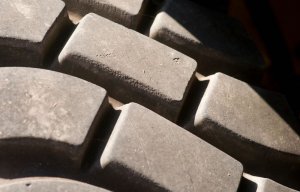
Chemical recycling route for car tyres
The validation of the technology marks a new step towards 100% sustainable tyres.

19th May 2021
Innovation in Textiles
|
Clermont-Ferrand, France
Leading tyre producer Michelin has successfully tested and applied the enzymatic recycling process for PET polyester waste of Carbios to create a high tenacity fibre that meets its technical requirements.
The enzymatic recycling process of Carbios, based in Clermont-Ferrand, France, uses an enzyme capable of depolymerizing the PET contained in various plastics or textiles – bottles, trays, polyester clothing etc. – and allows the infinite recycling of all types of PET waste. It also allows the production of 100% recycled and recyclable PET products, with the same quality as virgin PET.
Conventional thermomechanical recycling processes for complex plastics do not achieve the high-performance PET grade required for pneumatic applications. However, the monomers resulting from the Carbios process, which uses coloured and opaque plastic waste such as bottles, once repolymerized as PET, make it possible to obtain a high-tenacity fibre, meeting Michelin’s requirements.
The technical fibre obtained is processed with the same prototype installations. This high tenacity polyester is particularly suitable for tyres, due to its breakage resistance, toughness, and thermal stability.
“We are very proud to be the first to have produced and tested recycled technical fibres for tyres,” said Nicolas Seeboth, director of polymer research at Michelin. “These high-tech reinforcements have demonstrated their ability to provide performance identical to those from the oil industry.”
The Carbios enzymatic recycling process therefore enables Michelin to get one step closer to its sustainable ambitions, and contributes to the entry of tyres into a truly circular economy. Michelin is committed to achieving 40% sustainable materials (of renewable or recycled origin) by 2030 and 100% by 2050.
Every year, 1.6 billion car tyres are sold worldwide and the PET fibres used in them is around 800,000 tons.
When applied to Michelin, this represents nearly 3 billion plastic bottles per year that could be recycled into technical fibres for use in the company’s tyres.
“In 2019, Carbios announced it had produced the first PET bottles with 100% purified terephthalic acid (rPTA), made from the enzymatic recycling of post-consumer PET waste,” said Alain Marty, Carbios chief scientific officer. “Today, with Michelin, we are demonstrating the full extent of our process by obtaining from this same plastic waste, recycled PET that is suitable for highly technical fibres, such as those used in Michelin’s tyres.”

Business intelligence for the fibre, textiles and apparel industries: technologies, innovations, markets, investments, trade policy, sourcing, strategy...
Find out more